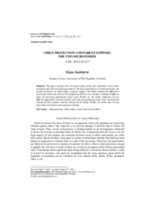This paper examines the two basic models of the state authorities’ intervention into family life aimed at protecting children. The first model focuses on child protection; the second one focuses on child welfare or family support. The author analyses the differences and tensions that arise between the proponents of these two concepts, resulting in different styles of conceiving professional social work. Further on, the author elaborates on two different approaches towards mistakes and risks accompanying social work, involving the concept of risk avoidance and the concept of risk taking. Finally, the author observes the interconnectivity between the analyzed concepts.

